Town Hall Meeting Clarifies New Anti-Harassment Effort
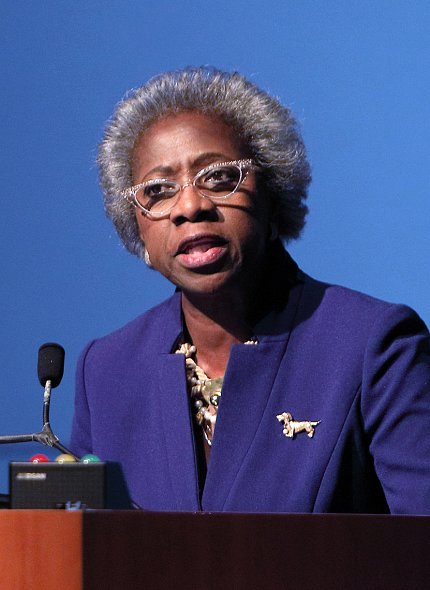
Photo: Chia-Chi Charlie Chang
At a Dec. 7 town hall meeting in Masur Auditorium that offered an overview of NIH’s new anti-harassment plan, NIH director Dr. Francis Collins called the event “one of the most important conversations our community has ever had…Harassment of any kind goes against the very core of what NIH represents.
“We’re done worrying about whether this conversation is uncomfortable,” he continued. “Our priority is to deter harassment…and to foster a culture of respect at all facilities and among all staff, including fellows, trainees and contractors.”
Quoting from a recent report on sexual and gender harassment of women written by the National Academies of Sciences, Engineering and Medicine (NASEM), Collins called such harassment “fundamentally a problem of culture…We need to redefine our NIH culture to say that such actions are unacceptable.”
NIH’s new approach to a problem that has roiled society in general over the past few years grew out of a meeting held in December 2017 by NIH’s women scientist advisors (WSA) committee, explained Dr. Kelly Ten Hagen, the NIDCR representative to the committee.
Although WSA was formed in 1993 to address the continuing problem of the underrepresentation of women in science, the meeting in late 2017 gave birth to a new entity at NIH: the anti-harassment steering committee, chaired by NIH principal deputy director Dr. Lawrence Tabak.
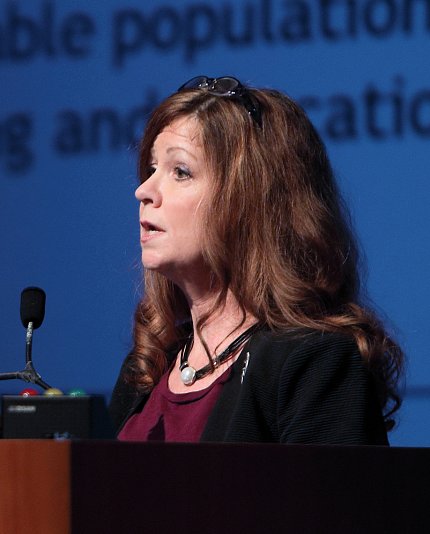
Photo: Chia-Chi Charlie Chang
“Our overall goal is to ensure that human beings are treated like human beings,” said Ten Hagen, “so that we can all achieve our potential in a harassment-free environment. It’s got to be a community effort.”
To that end, all who work at NIH—employees, contractors, fellows, trainees—will be asked to take a harassment survey this month, so that the agency can assess its own workplace climate. The survey, developed with the oversight of Dr. Hannah Valantine, chief officer for scientific workforce diversity, is to be taken “whether you have been harassed or not,” said Tabak, who spoke to the crowd via phone; he had been called to a meeting downtown.
Tabak invited all to review the new anti-harassment policy, located at https://civilworkplace.nih.gov.
Prior to the institution of this policy, NIH’ers with concerns about harassment of any kind typically took their issues to their own institutes and centers, said Julie Berko, director of the Office of Human Resources. However, “ICs are no longer managing these allegations,” she said. The NIH Civil Program has been bolstered and is now the first place anyone with a concern can seek help.
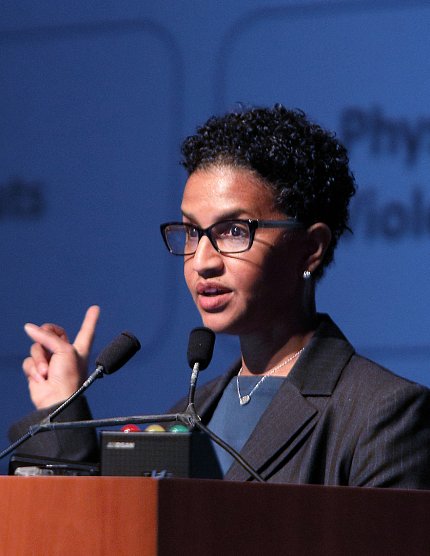
Photo: Chia-Chi Charlie Chang
The office has a hotline for anonymous reports (833-224-3829) and a new web-based intake form (https://hr.nih.gov/working-nih/civil/intake-form).
Berko cautioned that OHR cannot share with victims or witnesses the outcome if a disciplinary action results from a report to the Civil Program. “All allegations are taken seriously and will be addressed appropriately,” she noted.
Berko then addressed the new Personal Relationship Policy Statement. “We do not want to be the relationship police, ” but she emphasized that any personal relationship between employees in which one exerts career influence over the other must, from now on, be reported to the designated IC official, which is the executive officer in most cases.
Valantine urged a robust response to the Workplace Climate and Assessment Survey, which will be open for 8 weeks and will be confidential and de-identified. “We need a high response rate for meaningful data,” she said. The survey will be administered independently, not by NIH, and will include questions about general behaviors, not just sex or gender-related ones.
“I want to assure you, the results [of the survey] will not just sit on the shelf, as with some other surveys,” Valantine said. “This one is all about taking action to prevent sexual harassment…We need everybody’s voice, so we can effect change.”
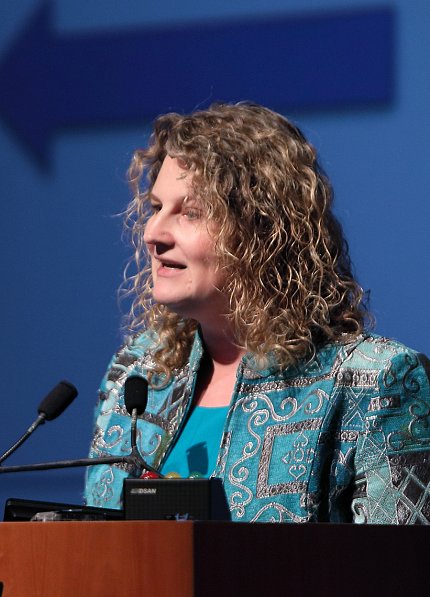
Photo: Chia-Chi Charlie Chang
Dr. Carrie Wolinetz, Collins’ acting chief of staff, noted that the NASEM report is now reverberating throughout science and medicine and is changing the culture. The report demonstrates that sexual harassment is “not just bad for women, but bad for science.”
Wolinetz announced the creation of a new working group on grantee institutions’ policies regarding harassment, which will report to the advisory committee to the NIH director.
“Culture change is a collective responsibility,” she said. “We need to ask ourselves, how can we each do better?”
A Q&A session took up the second half of the hour. Its dozen queries included several seeking clarity about managers’ reporting responsibilities (they are accountable for reporting allegations of harassment made to them by subordinates); the Civil Program as the first contact for all allegations of harassment, regardless of one’s employee/trainee/contractor status, if an issue arises (even in the rare case of a patient abusing a caregiver); and the deliberate inclusion of bullying as a form of inappropriate conduct in the new policy.
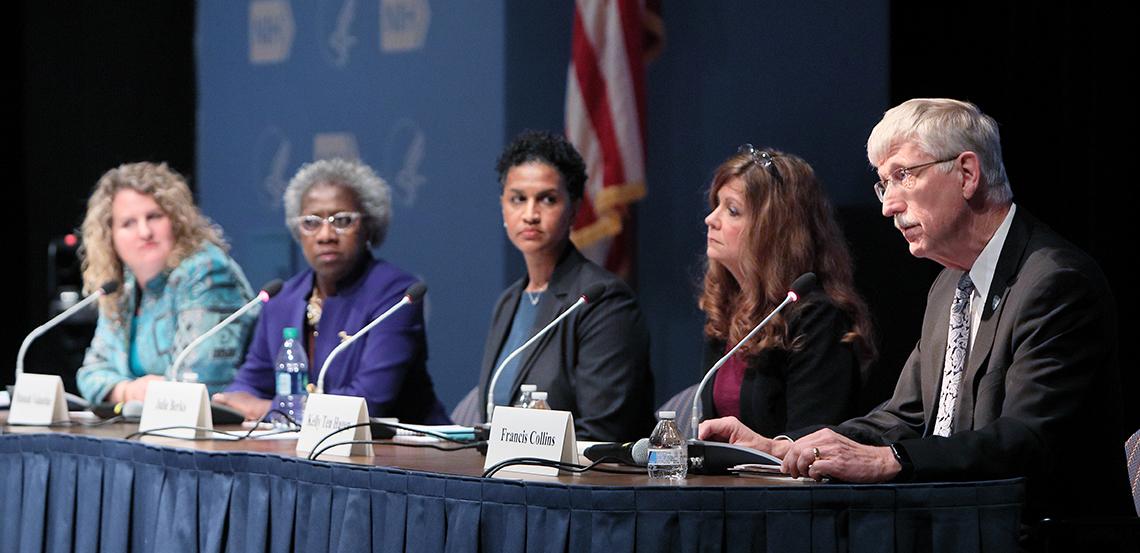
Photo: Chia-Chi Charlie Chang
The final question of the meeting offered at least a brief chance for levity. Observing that the new Personal Relationship Policy Statement is confusing among the 27 ICs, NHLBI’s Dr. Cindy Dunbar, co-chair of the Assembly of Scientists at NIH, wondered about a rumor that trainee-trainee relationships are now being discouraged. “Is this true?”
“I do not think NIH wants to be in a space of basically implying that all romantic relationships are dangerous and should be stopped, right now,” said Collins, banging the table for comic emphasis. After clarifying that some relationships involving a power differential do carry risk, he concluded, “We are not trying to discourage relationships. We want people to have full and wonderful lives—as long as nobody gets hurt.”
